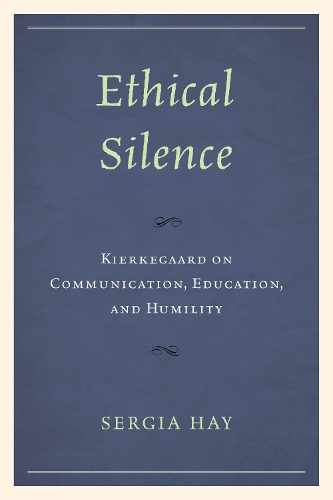
Ethical Silence: Kierkegaard on Communication, Education, and Humility
(Paperback)
Publishing Details
Ethical Silence: Kierkegaard on Communication, Education, and Humility
By (Author) Sergia Hay
Bloomsbury Publishing PLC
Lexington Books
9th May 2022
United States
Classifications
Professional and Scholarly
Non Fiction
Philosophy of religion
Philosophy
198.9
Physical Properties
Paperback
126
Width 155mm, Height 220mm, Spine 10mm
200g
Description
Ethical Silence: Kierkegaard on Communication, Education, andHumility examines a new area of Kierkegaard scholarship: the ethical value of silence. Through exegesis of Kierkegaards later writings, works in what is known as his second authorship, Sergia Hay argues that silence is an essential element of his Christian ethics. Starting with an overview of Kierkegaards ideas concerning ethics and communication, Hay builds a case for a Kierkegaardian notion of ethical silence by showing how silence contributes to the fulfillment of ethical imperatives by halting chatter, setting the fundamental tone for ethical activity, curbing excessive self-love, and providing another mode for educating and expressing love. Most importantly, silence can be used to humble the self and elevate the neighbor, creating conditions of Christian equality. Ethical silence is not the silence of the ineffable or what cannot be said, this is the silence of what can be said but should not.
Reviews
"In her Ethical Silence, Professor Sergia Hay bestows a compelling and much-needed analysis of Kierkegaards axial concept of a 'second ethic.' In addition, the author lays out a groundbreaking account of the connections between this second ethic and Kierkegaards pronouncements on both indirect communication and the ethical value of silence. Remarkably, this erudite volume is so clearly and gracefully composed that it warrants a space on the bookshelves of both novice and advanced students of the Danish firebrand."
-- Gordon Marino, St. Olaf College"Kierkegaard wrote that freedom, and by extension goodness, is always 'communicating.' Sergia Hay points to the many ways in which silence shapes Kierkegaards communications to us. She highlights the power of the silence that so permeates the authorship, its ambiguities and paradoxes, and probes its aims. This is a wise, frank, and persuasive textone that locates silence not only in the hiding places of the aesthetic, nor in the sublime reaches of religious transcendence, but at the core, and the limit, of our ethical striving."
-- Vanessa Rumble, Boston CollegeAuthor Bio
Sergia Hay is associate professor of philosophy and director of the Wild Hope Center for Vocation at Pacific Lutheran University.
